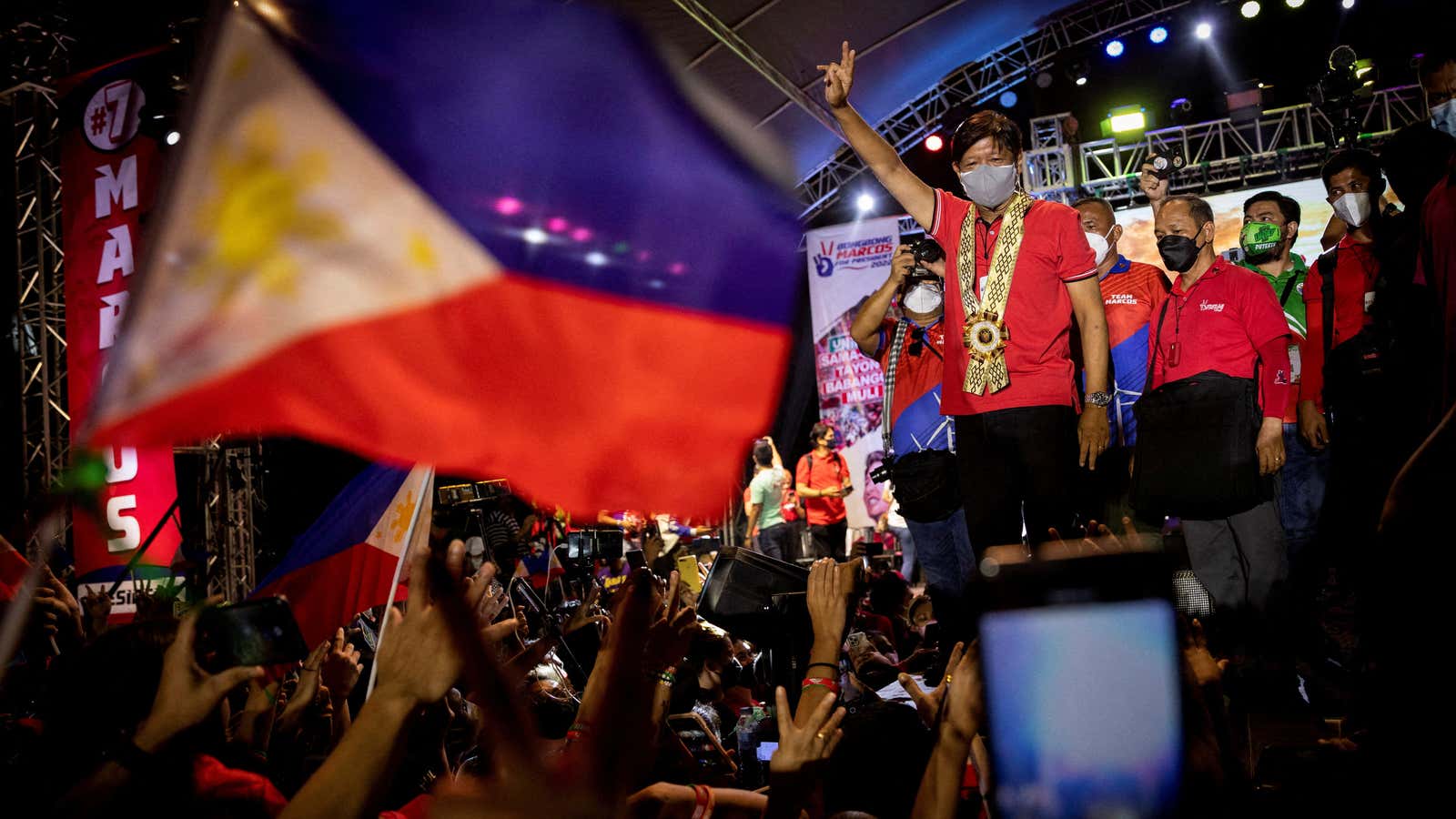The last time a Marcos was president of the Philippines, his two-decade rule was brought down by waves of mass protests. Ferdinand Marcos Sr., along his wife Imelda, of the 3000 shoes, their family, and a convoy of cronies and loyalists, fled into exile in Hawaii in 1986. Ferdinand died three years later. In a country prone to dynasties, the people declared that the Philippines would never again fall under the sway of a Marcos.
But now, his son, Ferdinand “Bongbong” Marcos Jr., is poised to win the presidency in next Monday’s election to select a successor to president Rodrigo Duterte. (Since the People Power revolution, Philippine presidents are limited to a single term.)
Marcos Jr. narrowly lost to the current vice president, Leni Robredo, in 2016. At next week’s elections, she’ll be his nearest rival in a crowded presidential race. This time, however, polls published just a week before the May 9 vote show Marcos with a more than 30-point lead over Robredo. The next eight candidates, who include boxer Manny Pacquiao, collectively have just over 15% of the vote. If Marcos is victorious, he will likely be the first president in over 30 years to win with a majority of the vote.
Nostalgia for a manufactured past
The Marcos family has spent the decades since losing power rehabilitating the family name.
In recent years, much of that has played out in glossy YouTube and TikTok videos, and on other social media platforms, often laced with disinformation. (A director at Facebook called the Philippines “patient zero” for the weaponization of social media during elections.)
The video campaigns recast the elder Marcos’ administration as one of ambitious infrastructure building, national glory and worldwide respect—an imagined image of the past that many people would like to see the Philippines become. Duterte too played a role—acceding to a longstanding family request to bury the deceased dictator in Manila’s Heroes’ Cemetery.
Nicole Curato, a professor of political sociology at the University of Canberra who specializes in the Philippines, says that when Marcos Jr.’s supporters recall his father’s era, they’re not romanticizing strongman rule—the disappearances and torture of dissidents, staggering kleptocracy, or the suppression of basic democratic freedoms under martial law. According to a 1975 report by Amnesty International, under Marcos Sr., 70,000 dissidents were incarcerated, many after warrantless arrests. There were some 35,000 documented cases of torture, 77 disappearances, and over 3,000 killed.
Instead, “there is a romanticization of the celebration of how great the country could be if we have the right leaders in power,” Curato said. Rather than being remembered in ignominy, Marcos Sr.’s legacy now looks to be powerful enough to win his son the presidency.
A “palatable” kind of autocracy
At an April 18 rally in Cebu, the country’s second largest city, Philippine flags fluttered over a cheering crowd of tens of thousands as they sang along to soaring anthems about national greatness. They pointed their cell phone cameras at Marcos Jr. and Sara Duterte, the vice-presidential candidate, as they waved from a flood-lit stage while images of roaring tigers and gliding eagles swept across giant screens.
A pop singer riled up the crowd by saying that Marcos Jr. would soon be returning to his ancestral home, a reference to Manila’s presidential palace. Sara Duterte held up a photo-realistic drawing gifted by a fan, imagining, her, Marcos Jr., Rodrigo Duterte and the late Ferdinand Marcos Sr. together, and the crowd cheered louder. Daog na! they chanted, he’s already won.
Marcos Jr. hasn’t explicitly stated ambitions to undermine Philippine democracy, but both and he and Sara Duterte enjoy popularity that is “based on the popularity of their fathers, who have a reputation for dictatorial tactics in maintaining control over the state,” Curato said. (Surveys last year suggested Sara Duterte, the mayor of Davao city in the southern Philippines, and daughter of the current president, would have been an immensely popular presidential candidate in her own right.)
A Marcos Jr. and Sara Duterte administration, Curato said, would fall under a more modern iteration that is less about the military rule, harsh curfews, and violent attacks on political opposition favored by their fathers. They will be elected democratically, but are likely to use democratic institutions for authoritarian ends, like curtailing criticism and accountability, a tendency on show in Marcos Jr.’s refusal to attend debates and limited access for journalists.
“What we see here is the more palatable face of authoritarianism,” she said.
